When WCTractor Owner Chris Wackman first bought the dealership in 2014, he had zero experience in selling equipment. In fact, he came from a family of oil barrel manufacturers and had been the fourth generation to run that family business.
“My dad died when he was 56, and I took over at 26,” says Wackman. “We were about a $30 million business. Our two competitors, one was $7 billion and one was $11 billion. So they had a 26-year-old trying to run the company and compete against those guys.”
Ultimately, the family decided to sell the oil barrel business, after which Wackman went to business school, then went “looking for a company to buy.” After looking at several different industries, in 2014 he discovered the local New Holland dealer in his hometown of Brenham, Texas, was for sale. He recalls having visited the dealership as a child.
“What I love about the business is it’s a way to really reconnect with the local community,” Wackman says. “I was looking for a reason to get back home. Beyond that, we had just come out of a massive drought here, probably the worst the area had seen in at least 100 years. I thought, ‘This industry is going to come back at some point.’ So I caught the very tail end of that. I was able to stretch the limited dollars I had and made the deal work. We started growing pretty fast and buying dealerships.”
WCTractor
Founded: 1939
Employees: 210
Ownership: Chris Wackman
Leadership team: Chris Wackman, Owner & President; Jason Gouge, Director of Sales & Marketing; Jim Parsons, Rental Director; Wes Landers, Director of Parts & Service; Steve Helm, Finance Director
Locations: 10
2023 revenue: $163,352,186
2030 revenue goal: $300,000,000
2023 market share: 40-50% depending on market
Return on assets: 11.46%
DMS: CDK
Brands carried: Kubota, New Holland, Bad Boy, McHale, Kuhn, Krone, Kawasaki, Polaris, Scag
His purchase of the then 5-store dealership made him the 5th owner of the business, which had begun as a Ford dealership in 1939. The dealership (then called Washington County Tractor) had 1 Kubota store and 4 New Holland stores.
“I think the drought really scared a lot of people around here,” Wackman says. “As we started investing, we started buying up Kubota dealerships as fast as we could. Those are the ones that have really expanded and blown up. For example, we bought a dealership down in Temple, and it was doing $2 million in revenue. Now, it’s making $20 million.”

WCTractor’s Waco store’s ‘T’ shape (the longer portion of the letter behind the shop, extending to the right in this photo) allows for easy future expansion as the business grows. Ben Thorpe
In looking for acquisition opportunities shortly after acquiring the business, Wackman found the local dealer landscape ripe with mom and pop shops run by an older generation that didn’t have a succession plan. As a dealer principal in his mid-30s, however, Wackman found himself competing with other young Kubota dealership owners in the area to buy these stores.
“I said, ‘I’m 33, everybody else is 70, they’re all going to want to sell out,’” says Wackman. “Let me just go buy everyone. It was a matter of finding enough capital fast enough to do it. But John Ewald [of 11-store Ewald Kubota, the 2017 Dealership of the Year] was young. Hunter Harris [of 9-store Lansdowne Moody] was also young. We all had the same idea.”
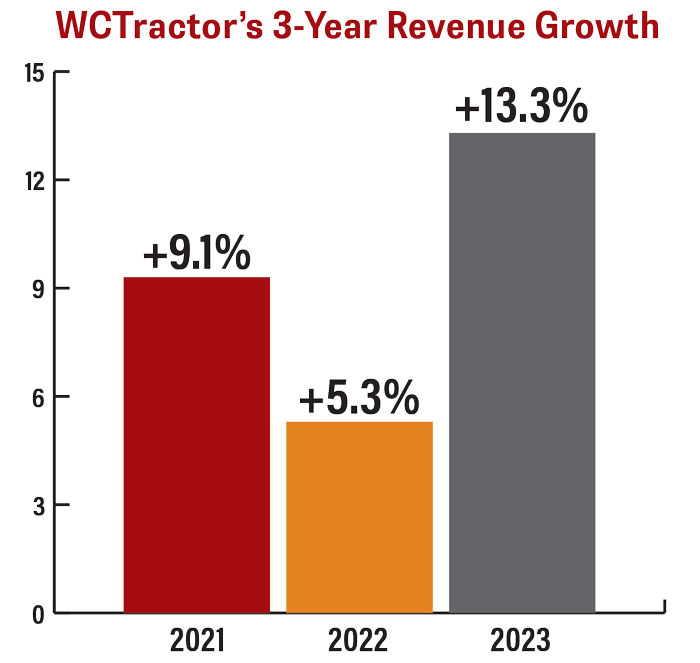
WCTractor’s 2023 revenue rose 13.3% year-over-year to $163 million, with $126 million in wholegoods revenue. Source: WCTractor
Today, WCTractor has 10 stores in Eastern Texas, brought in $163 million in 2023 revenue and is one of the largest Kubota dealers in North America. The company brought in $80 million in 2023 revenue from its Kubota business and $15 million from its New Holland business. The company’s last acquisition was of Virnau Sealy Tractor in Sealy, Texas, in July 2021.
‘T’-Shaped Stores
Wackman has big revenue goals for the company’s stores. He expects the dealership’s new Waco store to grow $20 million in revenue and plans to take the Sealy store from $15 million in revenue to $35 million in 5-6 years
Part of the growth plan is keeping a uniform format in the buildings that readies them for future expansion. This comes in the form of their ‘T’ shape, something WCTractor’s previous owners first implemented around the time he bought the company 10 years ago.
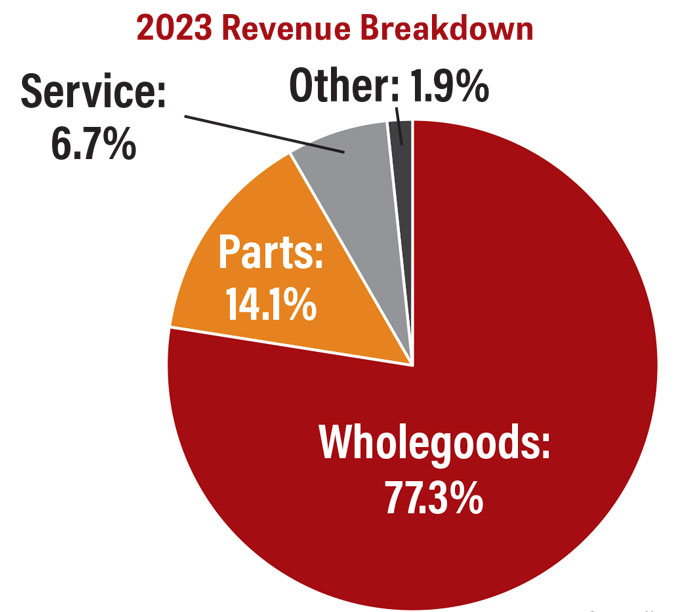
“The previous owners had just bought a Kubota dealership, and had just completed the new building when I bought the company,” says Wackman. “So I don’t want to take credit for it. But we’ve evolved just because of the cost of construction. The shops have stayed the same, but the showrooms have gotten smaller. The first one was probably triple this size, and you could put every piece of equipment you could think of in there. We’re not sure if that moves the needle necessarily when you consider the relative cost.”
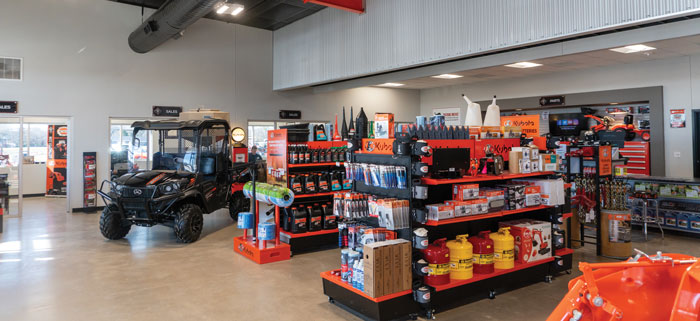
WCTractor has built smaller and smaller showrooms over the years, having found the cost of a larger showroom doesn’t necessarily pay for itself in improved sales. Ben Thorpe
Instead of large showrooms, WCTractor aims for directional spaces, with clear, deliberate paths from the front door right to the parts counter.
“We want our dealerships to have a front-row direct path to the parts counter,” he says. “We feel we can put other stuff in other places, but parts is what we want to see. A lot of our showrooms, we put down big runners all the way to the parts counter.”
The growth potential comes in the service layout, where WCTractor is able to easily expand the space by “elongating” the length of the “T” shape to add more bays. Wackman says as a store’s business grows, the sales side will usually expand first, but eventually the growing amount of sold equipment will need to be serviced. He says they’re already planning shop expansions at 2 stores.
“This is where most of our growth is,” Wackman says. “But it’s just pre-planning growth, really. It doesn’t take much to add another 2 bays. Our Bryan store right now is our biggest, and it is just exploding. We’ve added a bunch of field trucks, but we really need more space too.”
Cabinets at the Parts Counter
WCTractor President and Owner Chris Wackman is a big believer in Vidmar storage cabinets. So much so that they’re installed directly behind the parts counter so employees can simply rotate 180 degrees to find a part for a customer.
“We didn't have those in our original stores, and every store we build has more Vidmars because it’s just so easy,” he says. “These guys can just turn around and grab whatever.”
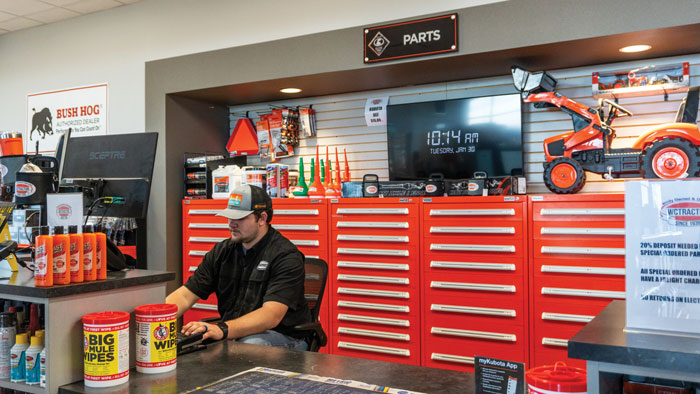
Parts Person Kyle Craven works within arm’s reach of several Vidmar cabinets, which reduces the time he spends searching in the back for parts. Ben Thorpe
Wackman notes that, for the area, the design of their dealerships can stick out to more rural customers. They ride a fine line, he says, between an urban and rural market.
“I’ve been accused of making our stores look like Lexus dealerships, and a lot of customers don’t like that necessarily,” he says. “Other dealers have scoffed at me because if you go into East Texas, it’s very intentional for them to have a lot of wood-grain and deer on the wall. As you get into more urban areas, they’re expecting more of a buttoned up corporate type of thing.”
The Year of Rental
Wackman says 2024 will be a year of streamlining the business and proactive planning. But more than anything, he says WCTractor is focusing on rapidly expanding its rental business, something it had been unable to do the past 2-3 years due to a short supply of equipment. Therefore, Wackman says 2024 will be the “year of the rental.”
“We started rental about 4-5 years ago,” he says. “We didn’t have any rental people in our company, we just did it ourselves, and we’ve lost our tail on it. We recently hired our rental director, Jim Parsons, and we plan on growing that part of the business hopefully 5-fold over the next year or two. We’re in the markets now with a lot of growth, it’s primarily construction equipment and side-by-sides.
“Kubota has a very good rental program where we get multiple years of no interest financing, which is pretty amazing. They also have programs to help us spin the equipment out after with extra warranty and things like that.”
“If somebody fails, it's usually because of us. We either hired the wrong person, or we didn't give them the tools to succeed…”
He admits they face tough competition, including rental powerhouse United Rentals. But the dealership is renewing efforts by bringing the rental business back into the company (it had been spun off as its own entity) and is aiming for $7 million in rental revenue in 2024 after several years of losing money. While WCTractor primarily focuses on compact construction Kubota equipment, it’s rented everything from mowers up to M7 tractors.
“There’s a lot of competition for sure, but I think we have the customer base,” Wackman says. “What you don’t realize is it helps your parts, it helps your service as you fix your own machines. It also gives you loaner units. It plays really well with the small construction contractor when you say, ‘Not only will we sell you stuff, we’ll also rent you whatever you need.’
“You don’t necessarily want to compete with the rental houses, who are your customers in some ways. But they understand you’re going to have a dealer rental fleet. So we’ve tried to stay away from the lifts and what you see at United Rentals.”
One aspect of this potential for rental success is a boom in local Texas construction. Wackman says the Texas “triangle” — the area between Dallas, Houston and Austin — will be one massive metropolitan area in his lifetime.
“70% of the population of Texas is in this triangle,” he says. “Everything’s exploding. There are 3 million people moving here in the next 5-6 years. They’re having to build homes, businesses, highways. It’s just nonstop insatiable demand, which has been great.”
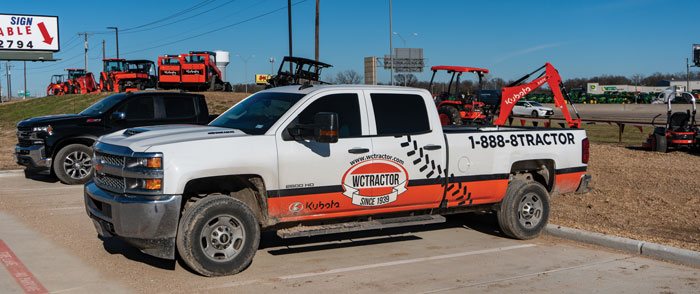
WCTractor is planning to have more techs on the road in the future as a way to upgrade its service offerings. Ben Thorpe
As part of this renewed rental effort, WCTractor begun installing rental-specific offices in its stores, similar to how it has parts and service counters.
Parsons refers to rental as the “fourth leg of the stool,” alongside sales, parts and service. The company has about $10 million in its rental fleet and wants to have $23 million by the end of 2024. To meet its rental revenue goal for the year, Parsons says it’s simply Rental 101: managing, controlling costs and selling.
“Traditionally at WCTractor, we didn’t have any outside sales for rental,” Parsons says. “It’s just the guys who walk in the door. We have hired an outside sales guy here for the northern half of our territory, and we’re hiring an outside sales guy for the southern half, maybe two. That’s really our push right now is getting the right sales team together.”
Selling rental is a tough, fast-paced job, says Parsons, that hinges on competitive pricing and customer service. He outlines 3 options all rental customers have: good pricing, on-time delivery and working equipment.
“You can have two of the three, so you choose,” Parsons says. “If you want the best price, I may not be able to deliver at 6 a.m. tomorrow. That’s always the pitch: you get 2 of 3.”
When hiring a rental salesperson, Parsons looks for 1 thing in particular: the ability to make a decision. Problems can be solved, but nothing at all can happen until someone makes the decision.
“Right or wrong, I’d rather make a decision,” says Parsons. “If the price is too low, we can solve that. If the machine is different from what they need, we can solve that. We can solve the problem. But at the end of the day, make a decision. In my opinion, so many people in today’s world aren’t willing to just say, ‘This is what we need. Make the decision.’ We need somebody who can talk, somebody who is personable, but somebody who is willing to commit.”
Marketing: Geofencing & Billboards
Every once in a while, Wackman gets recognized in public by strangers. And that’s because his face is on several WCTractor billboards.
The dealership uses them as one way to compete with United Rentals, by emphasizing its “human” factor and putting a face to the brand: Wackman’s face.

Wackman’s head juts off the top of this billboard, drawing even more attention to his face. Source: WCTractor
The billboards can run as cheap at $400-$500 a month, while the billboard outside the Waco store, which is off a major highway, costs about $2,000 a month, though the dealership gets a discount since the sign is on its property (this one does not feature Wackman’s face).
“We struggle with marketing in some of our smaller markets that don’t have a major TV or radio presence, so we do a lot of digital, but then we put some billboards up,” he says. “It's really the only kind of media you can get. We don’t want to do local newspapers. We used to do that and just spent a fortune and didn’t get a lot of return.”
The dealership also gets into the community through junior livestock auctions, calf cow clinics and working with Texas A&M Univ. in College Station, Texas.
“We do anything where we can touch our customers and be involved on the ag side,” he says. “There’s a lot of people coming out from Houston who want to own their 20 acres and have a couple cows, but they don’t have any idea what they’re doing. We try to get involved there.”
WCTractor also uses a “pay per click” program, through which it pays to have the company website appear as a top “sponsored” option on Google searches and are only charged for each time the link is clicked. The dealership also leans into geofencing its digital ads, whereby WCTractor ads will only appear in certain geographical areas it’s targeting.
The Impact of EVs on Dealer Operations
WCTractor President and Owner Chris Wackman believes the arrival of electrification in the rural lifestyle equipment space will change how dealers operate. However, he’s never had a customer walk through the door asking for an electric machine.
“I think that's the way the world is going,” Wackman says. “I'm by no means an expert, but I think it's going to change the way dealerships operate. It's going to change the service aspect. I don't know what the limiting factors would keep it from that, but I would imagine the cost of the batteries is going to be prohibitive. They have to bring that down for it to ever gain traction.”
“We do a lot of geofencing — finding a certain area, people travel through it in some way, and then they start getting ads on their phones and stuff like that,” says Wackman. “We've tried to be on the front end of that because I think there’s other people catching up now. But 5-6 years ago, we were truly way out front, and I think it helped us a lot.”
“The reason we like digital is because you can really zero in on the person who’s actually interested in your product. Whereas if you do radio advertising, say in Houston, you’re advertising to 2-3 million people who might not have any interest in your product. You’re spending so much money, and they don’t care. We just feel digital is more bang for your buck.”
Next Step Selling & KPIs
WCTractor Director of Sales & Aftermarketing Jason Gouge has a current goal in the dealerships sales department: maintaining next step selling. He admits that many salespeople are great with what’s in front of them but not with prospecting. One way to promote that behavior, according to Gouge, is to connect it to compensation. Because according to him, saying, ‘If you have better follow-up, you’ll sell more, and you’ll make more money’ doesn’t work.
“Salespeople are not great at keeping contact with active quotes of the past,” Gouge says. “But if the quote’s a week old or more, I have guys who could close amazingly well. With our CRM, we’re going to find ways to connect the dots between that behavior of maintaining connectivity to existing quotes and compensation. We don’t know how we’re going to do it yet, but I’m more concerned about fair measurement of that behavior. In other words, I can’t reward or punish somebody if my measuring stick is broken.”
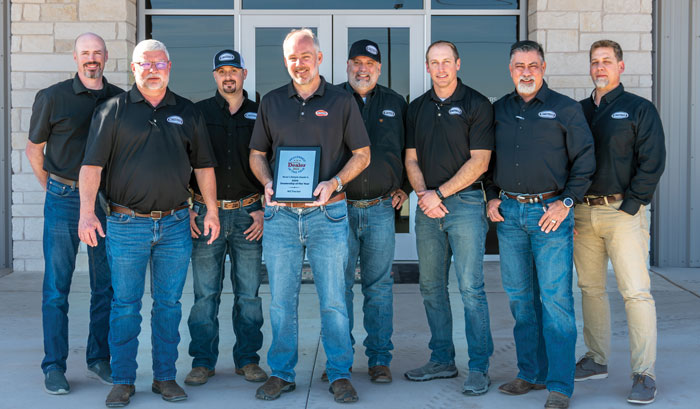
(l-r) Steve Helm Larry Rosenbaum, Josh Church, Chris Wackman, Jim Parsons, Josh Kubiak, Wes Landers and Jason Gouge. Ben Thorpe
WCTractor is implementing the Handle CRM, which is part of CustomerTrax. Handle will also help with tracking other KPIs unrelated to next step selling. Sales staff are currently maintaining their quote logs in spreadsheets, which Gouge admits is difficult to manage.
“I have a scorecard that equally weighs 4 measurables: total sales dollars, total margin dollars, margin percentage and total units sold,” he says. “Out of 29 salespeople, if you were No. 1 in all 4 of those categories, you’d have a score of 4, which would be the perfect score, and you’d be salesperson of the year. If you score 29th on all 4 categories, you’d score 116, and that would be the last. I scale them all and show them where they rank in the top, mid or bottom third.”
Opportunity in Rural Lifestyle Remote Service
Another key growth area for WCTractor, according to Wackman, is investing in a fleet of trucks for remote service. He admits this is unconventional thinking for a Kubota dealership, but he believes as the dealership steers more toward rental, construction and eventually large ag equipment, this will become a crucial part of the business. He says the dealership is considering bringing in an outside company for a truck fleet management plan.
“We’ve invested a lot in service trucks outside the dealership,” he says. “I think that’s where the majority of our growth is probably, more of a field service type of function, which is kind of unique to Kubota guys because they haven’t had the need to do that. But as we get more and more in rental, construction and into the bigger ag, it makes sense for us to have field service.”
Wackman says he sees a need in their business for remote service to the weekend warrior customer, who would much rather have a technician come to them than haul their machine in for repair.
“Employees will respect executives more if they know the executives can speak their language and do their job…”
“Our business is a lot of construction equipment, a lot of contractors, but there’s a lot of people who also live in the big cities who have weekend homes,” he says. “They would much rather call us and say, ‘My tractor’s in the barn, here’s the code to the gate. I don’t have time to bring it in because I’m only out at my place once a month. Just come fix it.’
“We charge $100 a trip, and then it’s an extra $10-$15 an hour of driving. So it pays for the truck. We’re not getting rich off it, but it’s a way to expand our offering. At the end of the day, anybody can sell a compact tractor. We don’t want to be the cheapest guy. In order to not do that, we’ve got to offer incredible product support on the back end. And that’s one way to do it.”
Finding Young Leaders
One defining feature of WCTractor in Wackman’s eyes is having a young, self-made leadership team. Two company directors began at low level positions and made their way up. Wackman sees every acquisition as a chance to “reshuffle the deck,” move employees up the ladder and perpetuate an aggressive culture of opportunity.
“The type of employee at the company when I bought it was your local guy,” Wackman says. “He came in as a parts guy, and he wants to be a parts guy forever. Over time, those people have faded, and we’ve brought in young guys who are highly educated. They’re aggressive, and they want to move up.
“They’re willing to stick it out a little longer. Maybe they’re not making as much as some of their friends are making right now, but they see what they could be doing. They see what’s in front of them.”
Having a relatively younger leadership team imbues WCTractor with a different kind of ambition that can only come from young professionals looking to prove themselves. It also comes with the benefit of having more time for succession planning.
“Being young, I think everyone has that same sense of urgency,” he says. “We’re able to push that through the business down to the bottom, having young people who are aggressive and want to be professional. They have some aspiration and some ambition. It plays into the whole idea of promoting from within and from the bottom up.
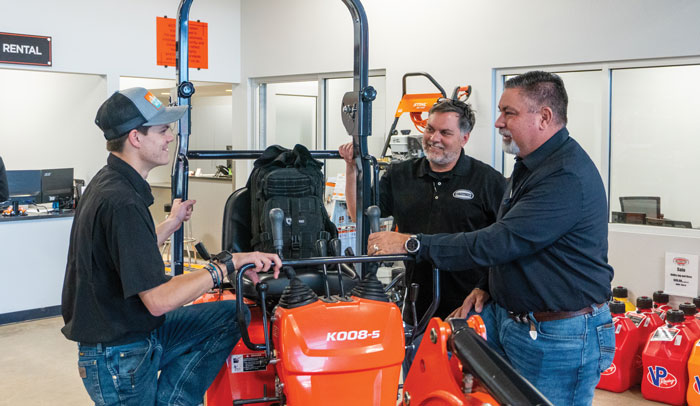
Having leaders like Store Manager John Sumner (middle) and Director of Parts & Service Wes Landers (right) rise through the ranks helps them gain employees’ respect. Ben Thorpe
“We’ve worn it as a badge of honor that we were all under 40 and taking over the world. Now we’re all over 40, and I’ve got more gray hair. But on a purely succession plan basis, it’s nice to be able to plan for the next 20 years and know that you’re not going to age out of this thing for a while.”
Wackman also hangs his hat on fostering a company culture devoid of micromanagement. He says they’ve tried to hire the right people and simply let them do their job.
“We all want to do well. We all want to win. But we’re not a cutthroat ‘do this or you’re out’ company,” he says. “We’re going to work with someone. If somebody fails, it’s usually because of us. We either hired the wrong person or we didn’t give them the tools to succeed.”
In the same vein as being anti-micromanagement, Wackman isn’t a fan of a “corporate mindset.” Part of the benefit of having self-made executives, he says, is their connection to all levels of the business and their first-hand understanding of what WCTractor employees are doing.
“Our employees will respect the executives more if they know the executives can speak their language and do their job,” Wackman says.
Ultimately, Wackman sees the last few years of building a young team of hungry leaders as a long-term investment that’s finally paying off.
“That talent is starting to show through,” he says. “We’ve put a lot of effort over the past 5-6 years into improving our processes. Even though we’ve grown substantially, I haven’t taken much money out of the company. Everything’s been reinvested either into people or buildings or processes or technology. Assuming we don’t have a lot more acquisitions in front of us in the short term, now it’s time to reap what you sow. My hope is over the next couple of years, with the team in place, we start to make some money.”







